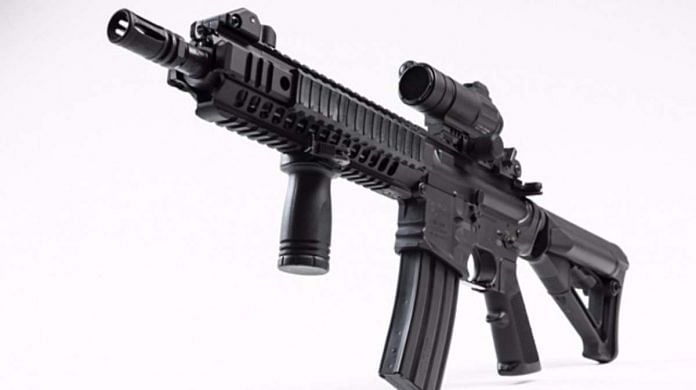Gandhinagar: UAE firm Caracal, which lost out on a mega deal to deliver close-quarter battle (CQB) carbines to the Army despite emerging as the lowest bidder, has tied up with an Indian company to produce its portfolio of small arms via the ‘Make in India’ route.
Although the firm is yet to zero in on a location to set up its manufacturing unit in the country, Caracal CEO Hamad Saslem Al Ameri told ThePrint that they are already sourcing over 50 per cent of components from India for carbines and snipers that are being manufactured in its UAE factory.
“We are very optimistic about the Indian market which is large if you consider the armed forces and the police. Over the last year and half, we have been sourcing multiple components of our rifles from India. Over 50 per cent of the components are from India,” he said on the sidelines of the DefExpo 2022, being held in the capital of Gujarat.
The UAE firm has partnered with Icomm Tele Limited – an Indian company that deals in electronics and with no prior experience in small arms – to bring its portfolio to India.
“Our Indian partner may not have prior experience in small arms but they bring to table their huge technical expertise. We will set up a manufacturing plant here where we plan to even manufacture the barrel,” the Caracal CEO said.
Army’s quest for close-quarter battle carbines
The CQB carbine project was initiated by the Army in 2008 to replace its outdated and aging 9mm British Sterling 1A1 submachine guns that are in service.
Both state-owned Defence Research and Development Organisation (DRDO) and Ordnance Factory Board (OFB) had failed to meet the Army’s requirements and hence a global tender for procurement of 44,618 CQB carbines was issued in 2011.
While four companies — Israel’s IWI, Italian Beretta, and American firms Colt and Sig Sauer — took part, only IWI qualified as the others contenders could not meet the qualitative requirements pertaining to the night vision mounting system.
However, the defence ministry did not go ahead with IWI because it had become a single vendor case, which, according to the government’s procurement manual, is not allowed.
In 2017, the Army had issued a global Request for Information (RFI) — a process initiated to gather information on what is available in the market — for the purchase of 2 lakh carbines, while a separate process was rolled out to procure 93,895 under Fast Track Process (FTP).
Caracal had emerged as the lowest bidder but the contract for its CAR 816 had run into rough weather over a number of issues, including costs and complaints from other bidders.
In 2020, ThePrint reported that the government had decided to scrap the project altogether.
However, earlier this year, the CQB project, first initiated in 2008, got a fresh lease of life after the defence ministry gave its nod to the plan to induct approximately four lakh of these weapons.
While the defence minister remains tight-lipped on whether the procurement will be through the ‘Buy Indian’ category or through the Indigenously Designed, Developed and Manufactured (IDDM) route, sources in the defence and security establishment had told ThePrint that it would be through the former.
Procurement through the ‘Buy Indian’ category will mean that several foreign companies, who either have or will have joint ventures with Indian firms, will be participating, including Carcal.
The main companies in contention will be Bengaluru-based private defence firm SSS Defence, state-owned OFB, PLR of the Adani Group and Kalyani Group — which has a tie-up with French firm Thales but is also in talks with the DRDO.
The Jindal Group, which has tied up with a Brazilian firm called Taurus, and Neco Desert Tech, a joint venture between Indian and American firms, will also be in the fray.
Also read: Army’s quest for close-quarter battle carbines continues. Here are its options



